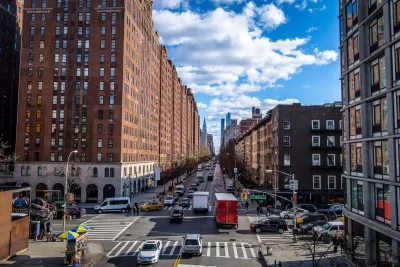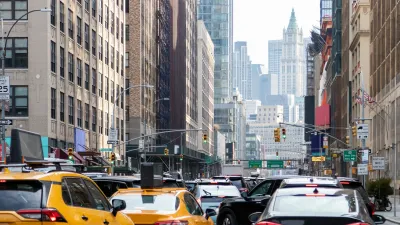A federal Finding of No Significant Impact moves the program closer to implementation, which could happen as early as May 2024.

“The Federal Highway Administration (FHWA) has issued a Finding of No Significant Impact (FONSI) for New York City’s Central Business District Tolling Program (CBDTP), also known as congestion pricing, following a 30-day public review of the Final Environmental Assessment,” according to an article by Mischa Wanek-Libman in Mass Transit Magazine.
The FONSI signals another step forward for the program. Now, the Traffic Mobility Review Board (TMRB) will have to develop a toll structure and set up the necessary equipment.
“The program will charge vehicles a toll for traveling in Manhattan south of and inclusive of 60th Street, excluding through-traffic on the Franklin D. Roosevelt Drive, West Side Highway, Battery Park Underpass and roadway portions of the Hugh L. Carey Tunnel connecting to West Street.” It would be the first of its kind in a U.S. city. New Jersey officials have opposed the program, arguing it disproportionately impacts New Jersey residents who commute into New York City. But as a Streetsblog NYC article pointed out in 2021, the New Jersey commuters who would be subject to the congestion tax are overwhelmingly wealthier than those who use transit.
More on New York City’s congestion pricing program:
FULL STORY: FHWA issues FONSI for NYC congestion pricing

Maui's Vacation Rental Debate Turns Ugly
Verbal attacks, misinformation campaigns and fistfights plague a high-stakes debate to convert thousands of vacation rentals into long-term housing.

Planetizen Federal Action Tracker
A weekly monitor of how Trump’s orders and actions are impacting planners and planning in America.

In Urban Planning, AI Prompting Could be the New Design Thinking
Creativity has long been key to great urban design. What if we see AI as our new creative partner?

King County Supportive Housing Program Offers Hope for Unhoused Residents
The county is taking a ‘Housing First’ approach that prioritizes getting people into housing, then offering wraparound supportive services.

Researchers Use AI to Get Clearer Picture of US Housing
Analysts are using artificial intelligence to supercharge their research by allowing them to comb through data faster. Though these AI tools can be error prone, they save time and housing researchers are optimistic about the future.

Making Shared Micromobility More Inclusive
Cities and shared mobility system operators can do more to include people with disabilities in planning and operations, per a new report.
Urban Design for Planners 1: Software Tools
This six-course series explores essential urban design concepts using open source software and equips planners with the tools they need to participate fully in the urban design process.
Planning for Universal Design
Learn the tools for implementing Universal Design in planning regulations.
planning NEXT
Appalachian Highlands Housing Partners
Mpact (founded as Rail~Volution)
City of Camden Redevelopment Agency
City of Astoria
City of Portland
City of Laramie





























